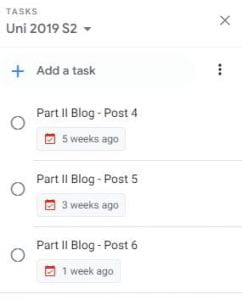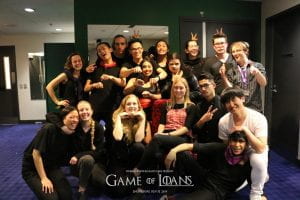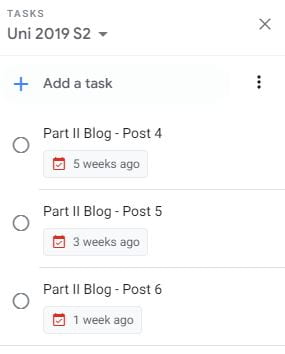Most of my posts so far have had a few things in common – a ridiculous title, an introduction with an unusual premise, and an AliExpress-quality sense of humour. This post has none of those things.

Okay, who am I kidding. You can’t escape my jokes … just as much as I can’t escape how little time I’ve been able to dedicate to this blog over the past six weeks. Fun fact – I had originally planned to have written all of my posts by now! But instead, here I am still owing the world tales and stories of my time in Part II Software Engineering. Let’s start by talking about just that – time. Delightfully meta.
(Speaking of meta, check the title of this blog post.)
You’ve probably been able to figure out from every blog hosted on this website just how crazily busy the engineering life has been. In particular, the second half of Semester 2 has been packed with on average about 3 deadlines a week (assignments or tests). In the final week of class alone, we had an assignment due on Monday, a presentation on Tuesday, a test on Wednesday, and a project submission on Friday (worth 40%!).
Phew! So how well did I manage my time this semester alongside all of this workload? You’ve probably figured out where this is going – just like the New Zealand Rugby World Cup campaign, it doesn’t end well.
Now, this is no ordinary Reflection-On-Learning kind of post. Because I’ve been recording exactly how long I’ve spent working each week for the entire year. And boy, is it a shocker. I present to you, the amount of time I spent working for all 14 weeks of the regular Semester Two:

Wait a minute. Doesn’t the University recommend that students “work” for 40 hours a week? Yes. It’s not as bad as it looks. There’s a strange phenomenon where we always feel like we’re working more than we actually are. A typical day where it feels like you’ve been going non-stop all day … is actually interrupted constantly by small stops and pauses. Breaks to reply to a text, to eat a snack, or simple moments of distraction add up to hours less work than you might expect. A typical “8 hour work day” probably translates into about 4-5 hours of real, tracked time.
Okay, well that doesn’t explain that massive block of ~20 hour weeks. If you work for, say, 5 hours a day over 6 days a week, shouldn’t that be 30 hours? Aren’t you 10 hours short almost every single week?
Yep.
I wish I had a clear cut explanation for why it was such a struggle for me to do the usual amount of hours this semester. Rather than stumble through a terrible impression of reasoning, I figured I would bring up three key takeaways on what I could’ve done better. If you go into software, bear these lessons so you don’t repeat my mistakes:
Be prepared for the coding portions to take up all of your time. In the second half of the semester 2, we received an enormous group project in SOFTENG 206 that involved creating an entire application from scratch. I’ll discuss the details more in my next post, but for now what you need to know is that, like water, the coding project will expand to fill all the available space in your timetable. There was a constant temptation to grind away endless hours on the code. It wasn’t uncommon to sink 2 hours into a small aspect of the app’s error handling and end up with a result that was barely visible to the end user!
The group project was stressful, but also a lot of fun to work on. Which naturally meant that before every submission, we typically worked on just the project and forgot about everything else. You can see this in the crazy jumps in the second half of the time-tracking graph. The project will be the one thing that takes up most of your time in the second half of Semester 2, so plan around it.
Keep up with additional study on your non-project courses. Both semesters of Software Engineering have a very unusual split of deadlines between their first and second halves. Typically, the first half only has a few due dates, and is actually surprisingly easy to get through without really knowing what you’re doing. The second half bites back, and bites hard. Most of the tests are in this half, as well as the three deadlines a week I mentioned at the start of this post.
If you aren’t prepared with a good foundation of work, your life will become very linear – work on something until it’s due, then work on the next thing until that’s due, repeat forever. I can say that with confidence because it’s exactly what I did in the first and second half of this semester. I wouldn’t recommend it. By being stuck in a linear mode of working, you’re constantly starting something just a few days or a week before it’s due, which is 1) very stressful, and 2) not conducive to you doing your best work. You also don’t have any time left to do extra study and get ahead, which creates this kind of vicious cycle. Don’t get caught in it.
Have something else to do with your time that isn’t Software Engineering. For the past two blog posts I’ve been promising to talk about doing stuff in your life that isn’t lectures and assignments. Here we are!

Although this semester has been a stressful cascade of endless deadlines, what has helped make it more bearable is having something to do that isn’t all hat. A life outside of uni, if you will. This can be a club on campus, some other kind of extracurricular, or even just a hobby you’re very involved in. For me, it’s been the Engineering Revue – a variety comedy theatre show with skits, a parody plot, half-naked boys dancing, and so much more.
Doing the Revue has probably been the single best decision I’ve made during my time at uni – it’s allowed me to meet so many awesome, immensely talented people while working together to produce something pretty cool. And it gave me something to think about – and talk to people about! – that wasn’t deterministic finite automata (yep, those are all real words) or ffmpeg video conversion in Java. Without the “productive distraction”, if you will, I might have just gone insane from all the work.
There’s no such thing as “I don’t have time for it” – it’s all about what you make time for.
———————————————————————————————————————————————
I imagine that reading this blog post must have been like watching a car crash in slow motion. Don’t worry, this incident has no fatalities (at least, not until I sit my SOFTENG 211 exam in a couple of days). I’m solidly set in Software Engineering and already thinking about what electives I want to take next year. But there’s no denying that no matter what specialisation you choose, second year is a huge step up in workload. I didn’t adapt to that challenge as well as I know I could have. But what’s life without a few challenges to make you earn your keep?
Speaking of next year, you, dear hypothetical Part I reader, are probably deep in thinking about what to choose next year. Are you ready to decide what to do with the next 45 years of your life? Okay, I’m exaggerating. It’s not that dramatic. But obviously you want to make the right choice – so my last two blog posts will be about just that, starting with a review of those Semester 2 courses that I kept up with so shoddily.
(And they won’t be a month away this time!)
